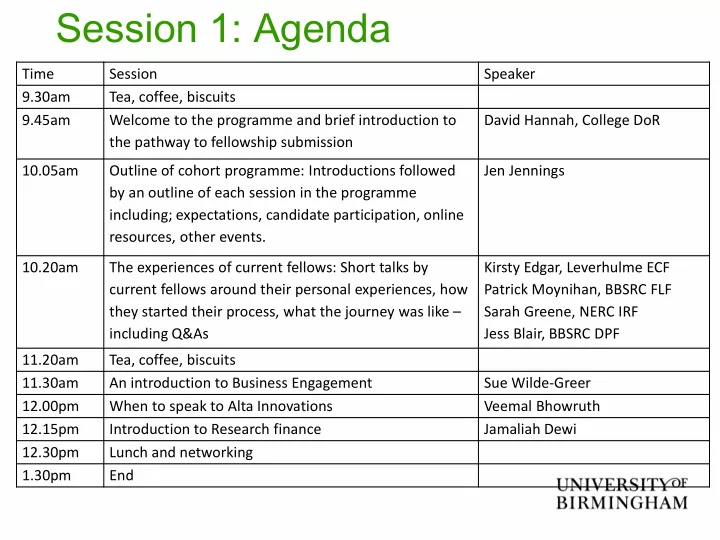

Session 1: Agenda Time Session Speaker 9.30am Tea, coffee, biscuits 9.45am Welcome to the programme and brief introduction to David Hannah, College DoR the pathway to fellowship submission 10.05am Outline of cohort programme: Introductions followed Jen Jennings by an outline of each session in the programme including; expectations, candidate participation, online resources, other events. 10.20am The experiences of current fellows: Short talks by Kirsty Edgar, Leverhulme ECF current fellows around their personal experiences, how Patrick Moynihan, BBSRC FLF they started their process, what the journey was like – Sarah Greene, NERC IRF including Q&As Jess Blair, BBSRC DPF 11.20am Tea, coffee, biscuits 11.30am An introduction to Business Engagement Sue Wilde-Greer 12.00pm When to speak to Alta Innovations Veemal Bhowruth 12.15pm Introduction to Research finance Jamaliah Dewi 12.30pm Lunch and networking 1.30pm End
LES Fellowships Cohort Session 1 Introductions, expectations and networking Professor David Hannah College Director of Research
Why apply for a Fellowship? A Fellowship will offer you: o Enhanced career prospects (prestige, profile) o The opportunity to define your research project o Time to focus on research o Independence o Opportunities to collaborate o The resources to build a research group o The opportunity to publish as senior author o Added value (funder mentorship schemes, networking events, training etc)
Are you ready? o Funders are looking to support the next generation of science leaders through their Fellowships o Competition is extremely tough. YOU must be able to demonstrate: – The potential to become an internationally renowned research leader – A proven track record of producing excellent science (PUBLICATIONS!) – A strategic vision (that aligns with the priorities of the funder) – Potential to act as an advocate for your field/funder
How to develop an application o Build your track record – Publish (top journals, independent of supervisor if/where possible) – Network – build your profile (within and outside academia) – Present at conferences – Take advantage of travel opportunities – Build your funding portfolio -use internal pots of money where possible – Organise events – demonstrate leadership amongst peers – Public engagement – Get involved in your department – teaching/student supervision
How to develop an application o Take advantage of the support on offer Profession College School al Services RSO DoR DoR Previous BE Mentor Applicants Panel Members Finance Network
LES Fellowships Cohort Session 1 Introductions, expectations and networking Jen Jennings Research Support Partner
Programme overview o Session 1 (4 th April) : – Introductions, expectations and networking. o Session 2 ( 4 th May ): – Person, Project, Place. Funder specific advice on all parts of the proposal, networking with current fellows (buddies). o Session 3 ( 24 th May ): – Pitch to Peers. and panel members Q&A
RSO Support o Why a Fellowship? – What will it mean for your career? o Funder landscape – Who funds Fellowships?, Success rates o Which funder/scheme to apply to – Career Pathways – Remit – Eligibility (you need to check) – Assessment Criteria o Advice on internal processes o Application support – Application form/Sections, Letters of Support, Institutional Statements, Review, Mock Interviews,
Meet the RSO team Fran Casey Jason Hutton Contact for bespoke Contact for GEES funding searches J.Hutton@Bham.ac.uk F.Casey@bham.ac.uk Helen Lambert Ipshita Ghose Contact for Contact for Biosciences Psychology and I.Ghose@Bham.ac.uk SportExR H.L.Lambert@Bham. ac.uk Jen Jennings Contact for support with complex, cross-College and interdisciplinary initiatives and proposals. J.L.Jennings@Bham.ac.uk
Success rates
Prioritisation panel ranking of grant applications Interview 10 Only a little improvement 9 needed to reach the cut off 8 Majority of 7 applications 6 score here 5 4 3 Can be removed via a pre- 2 sift (may be by non experts) 1
What makes a successful grant application? Vie View w fro rom a m a forme rmer C r Commi mitte ttee C Chair o Is it top quality internationally competitive science? o Is it addressing an important problem? o Is it novel and exciting? o Are the aims and potential outcomes of the grant crystal clear from the case for support? o Does the accompanying data support the proposal? o Is the work feasible – are there contingencies? o Has the applicant considered the potential impacts of the research? o Can a non-specialist understand why the work is important?
Questions?
Recommend
More recommend